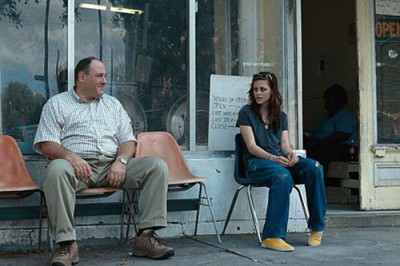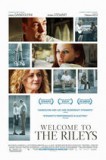| Reviews & Columns |
|
Reviews DVD TV on DVD Blu-ray 4K UHD International DVDs In Theaters Reviews by Studio Video Games Features Collector Series DVDs Easter Egg Database Interviews DVD Talk Radio Feature Articles Columns Anime Talk DVD Savant Horror DVDs The M.O.D. Squad Art House HD Talk Silent DVD
|
DVD Talk Forum |
|
|
| Resources |
|
DVD Price Search Customer Service #'s RCE Info Links |
|
Columns
|
|
|
Welcome to the Rileys

Jake Scott's Welcome to the Rileys is a great-looking movie, moody and evocative, anchored by a trio of fine performances. But there's an emptiness at its center; it regards the desperation of its characters from the outside, almost anthropologically. Scott and screenwriter Ken Hixon mount the conflicts and anxieties of their primary characters without seeming to really understand them--the people are conceived as constructs, and only puncture their obviousness through the skill of the actors playing them. But they can only lend the picture so much of their own soul.
James Gandolfini (sporting an odd, initially off-putting Tony-Soprano-meets-Matthew-McConaughey accent) plays Doug Riley, an Indiana businessman whose 30-year marriage to Lois (Melissa Leo) has been strained and disconnected since the death of their 15-year-old daughter. He's been carrying on an affair for years, but when his mistress dies, he finds himself particularly adrift. On a business trip in New Orleans, he wanders into a strip club, where he ends up in the company of Mallory, a 16-year-old stripper/prostitute (Kristen Stewart); he doesn't sleep with her, doesn't even touch her. Instead, giving her a lift home and taking in her unfortunate circumstance, he decides to take care of her.
It doesn't take much subtextual skill to get what's going on here; after his first encounter with Mallory, Doug is seen in his hotel room, gazing at a photo of his daughter. He's clearly taking on Mallory as a surrogate for his lost offspring, and one wishes that Scott (and Hixon) would have put in that one visual cue and left it at that. Instead, the film gets more explicit as it goes, and too often says things that are better left unspoken (Mallory's forceful "I'm nobody's little girl" is enough; we don't need Lois to add "She's not Emily!").
Scott and cinematographer Christopher Soos work in a muted, painterly style that is somewhat overprepared but unquestionably affecting. Their compositions are particularly eye-catching in the opening scenes--there's a gorgeous shot of Doug, in his pajamas, smoking in his garage with the sliver of light through the window falling across his face just so. But Scott is also occasionally guilty of sacrificing content for style; when Doug calls Lois to tell her he's staying in New Orleans ("I just know that I can't come home right now") he keeps her framed in the perfect center of the screen, but with her back to the camera. It's a nice composition, yes, but emotionally empty--we want (nay, need) to see what's happening on her face at that moment.
There are issues with the very character of Lois, though; her agoraphobia is introduced awkwardly and handled perfunctorily (a scene of her discovering the joy of the outdoors by walking across the moonlit grass in her bare feet is so precious, you want to throw something at the screen), an arc so obvious that it derails several scenes. And Leo, always an intriguing actress, lays it on a little thick here--that June Cleaver voice she occasionally lapses into with Stewart is just too much. She and Gandolfini have a nice, easy chemistry, though, and his is a clean, fully-formed performance--the way he holds all of his pain in his face in the early scenes, the urgency (and sometimes amusement) with which he regards Stewart's character in the second half.
Stewart's performance is, surprisingly, the most impressive. Her scrawniness and off-key beauty gives a credibility to her character--trashed up, she's actually believable as a wayward runaway-turned-stripper, even if she doesn't always sound natural mouthing her gutter dialogue (that said, "guys staring at your cooter like it's singing the star-spangled fucking banner" is a line that not many actresses could sell). But she's raw and ruined and very, very good, pushing further the kind of fragile sexuality that made her work in Adventureland so memorable.
So with so much in it that works, why isn't Welcome to the Rileys a better picture? The script, while frequently working on a moment-to-moment scale, never really gels, and fills in too many of the blanks too explicitly; director Scott relies too heavily in his visuals without trusting them like he should. More than anything, the film just doesn't burrow far enough in--it wants to be dark and gritty and real, but it seems to struggle to punch through those pretty surfaces, and doesn't quite pull it off.
Jason lives in New York. He holds an MA in Cultural Reporting and Criticism from NYU.
|
| Popular Reviews |
| Sponsored Links |
|
|
| Sponsored Links |
|
|
| Release List | Reviews | Shop | Newsletter | Forum | DVD Giveaways | Blu-Ray | Advertise |
|
Copyright 2024 DVDTalk.com All Rights Reserved. Legal Info, Privacy Policy, Terms of Use,
Manage Preferences,
Your Privacy Choices | |||||||











